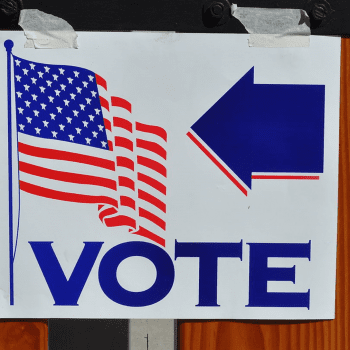
So here’s the deal: if you’re a progressive Democrat who believes that abortion has no real moral dimension, all it takes to vote for Hillary is some fairly standard, “when it comes to my guy, any accusations of misdeeds are clearly overblown and exaggerations by my opponents,” and you’re good to go.
But let’s say that’s not you. Let’s say you’re a Christian. You’re pro-life. You care about the future of the country, but you also believe in being fiscally responsible. You want to vote for someone who has neither done anything morally offensive nor criminal.
If you read your twitter feed, or your facebook news feed, or any number of blogs, you know that your fellow believers are divided between “it’s a grave sin to vote for Trump” and “it’s a grave sin to vote for Clinton.”
But guess what? There is no one single morally right decision on November 8th.
It’s a judgement call. It’s an evaluation of likelihoods and risks. And different people can reasonably come to different decisions about those risks.
Quick comparison: we are commanded to care for the poor. Progressives like to say that we are thus morally obliged to support generous government benefits, but reasonable people can believe otherwise — can believe that the command is hardly as specific as that, and that the command can be heeded by private charity, and that very generous social welfare benefits can do more harm than good.
But here we are, with two terrible candidates, as well as some impossible-odds third choices.
Trump? You can rule him out entirely for his behavior toward women, or Trump University and his other financial scandals, or you can evaluate his possible performance as president.
Clinton? You can rule her out entirely for her husband’s behavior toward women, or the trail of greed and corruption in her private server, the Clinton Foundation, etc., or you can evaluate her possible performance as president.
Is Trump’s profession of a conversion to the pro-life cause genuine, or will he lose interest as soon as the election is over? It’s anyone’s guess, as far as I’m concerned — but there are others who are convinced of the genuineness of his belief.
Is Clinton’s plan to provide public funding for abortion, as well as her alignment with an unapologitic “celebrate your abortion” Democratic Party, going to produce a massive increase in the number of abortions? Or will a Republican congressional majority force her to stay with the status quo?
Is Trump going to come to the rescue of hardworking Americans, by enforcing our immigration laws, or will he prove to be indifferent upon taking office?
How far will Clinton go in her plans for amnesty? Will a Republican congressional majority keep her in check, or will they be happy to lend her support?
Will Trump in fact implement a tariff? And what impact would that have on the economy?
Which of them will put peace at greater risk? — will Trump’s seeming indifference to Russian aggression lead them to move in on Poland or the Baltics, or will his rash thin-skinnedness provoke an extremely dangerous 3 AM decision? Or will Clinton’s aggressive rhetoric against Russia lead to a proxy or direct war in Syria?
These are all evaluations of risk – a supremely actuarial specialty. But I am not going to claim that my actuarial skills are up to the task of assessing these risks. My point is simply that those who make a different determination than you have not done anything immoral.
And even the fundamental question — is one of the two so dangerous, so risky, so likely to cause irreparable harm, that all the other’s flaws simply have to be overlooked?
I don’t know. I can’t give you a risk level, or an expected value calculation. But if your decision is different than your neighbors, well, that’s not an indicator of moral superiority or moral failure.
And, yes, I know that many people consider this election to be, as any other, a matter of first and foremost voting for the pro-life candidate. But if you suspect that candidate is only taking that position to get electoral support, and it might well evaporate afterwards, and worry that his Supreme Court nominees might be just as pro-Roe as the rest of them, and, what’s more think the chances of him starting a major war (rather than, let’s face it, minor war such as Iraq) are too great — that’s a bit of a different situation. And nothing in moral theology makes the decision for you of whether it’s a “wasted vote” to choose a third-party/independent candidate, does it?
I know that I, personally, can’t pull the trigger for either one of them. I’ll go with McMullin, fully aware that his chances are about the same as winning the lottery. I know that turns the election over to others, and I’m OK with that — though I admit that I can’t really say whether my answer would be different if my vote mattered, because it doesn’t, not here in Illinois.
So be nice to each other, would’ja?
image: from Wikimedia Commons, https://commons.wikimedia.org/wiki/File%3AFunny_Direction_Sign.Jpg; By Tolukra (Own work) [CC0], via Wikimedia Commons












